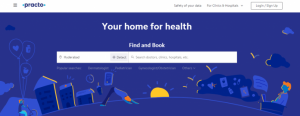Technology
Medtech Startups Which Are Changing The World

The healthcare industry is one of the most innovative fields in the world right now. From the kind of products to the kind of technology available, everything about the medtech startup world is changing for the better. Here are some of the most creative startups doing good in the world currently.
1. Clover Health

One of the most ground breaking unicorn startups in the world, Clover Health is an insurance startup which works to use data science and improve the conditions of preventive medicine. With over 25,000 benefiting from its services, Clover Health hit the headlines when it recently secured an investment of $ 130 million from Google! The startup aims at improving the lives of people not only in the United States, but all over the world as well.
2. Sensible Baby

Touted to be one of the major game changers of the baby monitoring industry, Sensible Baby was created with the aim of helping new parents breathe easy. While essentially similar to the functionalities of a standard baby monitor, the SmartOne device by Sensible Baby was launched so parents would not have to constantly worry about their child, especially due to the rising infant deaths through Sudden Infant Death Syndrome (a disease which still has no cure.) Furthermore, the device sends constant feedback to the parents’ smartphones, thereby ensuring constant contact!
3. Practo

Perhaps one of the most successful healthcare startups in India, Practo is a tool that helps schedule appointments with your doctors. Giving users a wide data pool of doctors specializing in various fields, Practo lets users look for specific departments and get treatment from the doctor of their choice. The tool also gives you a complete picture of how much the consultation is going to come up to and whether the city you live in has the doctor you need or not. A handy tool for people who do not have a direct access to doctors, Practo simplifies the lengthy process of finding and booking appointments.
4. Grow Fit

According to several surveys, a large number of lives were lost in India in the year 2016, primarily due to lifestyle diseases. While the number in itself is a staggering one, what makes this issue slightly more serious is that the expenses incurred because of these deaths is estimated to be almost $ 4.58 billion. Looking at this huge gap between the lives lost and the treatment available, Grow Fit was created. By working with an expert team of nutritionists, doctors and health analysts, Grow Fit looks at helping those who are susceptible to contracting these diseases and also works with solving issues through diet tips, health tips and behavioural insights.
5. PORTEA

Looking at the lack of proper healthcare facilities for the elderly and the people living in areas which are not accessible through technology, PORTEA was created to make access to medical facilities easy. Through remote diagnostics, point of care devices, monitoring equipment, doctors and medical professionals, PORTEA helps monitor and take care of patients who are in no position to travel to hospitals.
Through startups like these working on improving the lives of patients everywhere, innovators work every day to make treatment an easy process. If you think we missed out on any startups that have to be mentioned, comment and let us know!
News
Google Launches Startup Hub in Hyderabad to Boost India’s Innovation Ecosystem

Google has launched the Google Startup Hub Hyderabad, a major step in strengthening India’s dynamic startup ecosystem. This new initiative aims to empower entrepreneurs, innovators, and developers by giving them access to Google’s global expertise, mentoring programs, and advanced cloud technology. The hub reflects Google’s mission to fuel India’s digital transformation and promote innovation through the Google for Startups program.
Located in the heart of one of India’s top tech cities, the Google Startup Hub in Hyderabad will host mentorship sessions, training workshops, and networking events designed for early-stage startups. Founders will receive Google Cloud credits, expert guidance in AI, product development, and business scaling, and opportunities to collaborate with Google’s global mentors and investors. This ecosystem aims to help Indian startups grow faster and compete globally.
With Hyderabad already home to tech giants like Google, Microsoft, and Amazon, the launch of the Google Startup Hub Hyderabad further cements the city’s position as a leading innovation and technology hub in India. Backed by a strong talent pool and robust infrastructure, this hub is set to become a growth engine for next-generation startups, driving innovation from India to global markets.
Technology
Jio Unveils Cloud PC Service to Bring Affordable Computing to Indian Households

- Jio Platforms has launched JioPC, a cloud-based virtual desktop service that transforms any television connected to a Jio Set Top Box into a fully functional computer.
- Users simply connect a keyboard and mouse to access a desktop-like environment, complete with web browsing, productivity tools, and educational apps—all without needing a physical PC or extra hardware.
- The service is device-agnostic and works with all consumer PC brands, making advanced computing accessible and affordable for millions across India.
JioPC is designed to support a wide range of activities, from professional work to online learning and creative projects. By leveraging Jio’s robust cloud infrastructure, users can run even compute-intensive AI applications directly from their TV screens. The platform also ensures data security and reliability, as all files and settings are safely stored in the cloud, protecting users from data loss even if their device is reset or replaced.
With JioPC, Jio aims to democratize digital access and bring high-performance computing to Indian households at a fraction of the traditional cost. The service supports popular productivity suites like LibreOffice and Microsoft Office online, and Jio is offering a free trial to encourage users to experience the benefits firsthand. This innovative move is set to reshape how people in India work, learn, and connect in the digital age.
Technology
WhatsApp Introduces Ads in Updates Tab, Keeps Chats Ad-Free

Meta has officially begun rolling out ads on WhatsApp, ending over a decade of an ad-free experience since its acquisition in 2014. The advertisements will appear only in the Updates tab, specifically within the Status feature, which lets users share photos, videos, and text updates that disappear after 24 hours—similar to Instagram Stories.
Where Ads Will Appear
- Ads will be visible exclusively in the Status section of the Updates tab, keeping personal and group chats ad-free.
- Businesses can use these ads to encourage users to interact via WhatsApp messaging.
- Meta is also introducing paid channel subscriptions and promoted channels within the Updates tab, allowing users to access premium content and discover new channels more easily.
Privacy and Targeting
Meta has emphasized that private messages, calls, and group chats will remain end-to-end encrypted and free from advertising. Ads will be personalized using limited, non-sensitive data such as location, language, followed channels, and ad interactions. Users can further manage ad preferences if they link WhatsApp to Meta’s Accounts Center.
User and Business Impact
The move marks a major shift for WhatsApp, which has long resisted advertising to preserve a clean messaging experience. While some users have criticized the change, Meta sees this as a significant opportunity to monetize WhatsApp’s 3 billion users and over 200 million businesses on the platform.
In summary, WhatsApp’s new ads will be confined to the Updates tab, ensuring personal messaging remains private and uninterrupted, while opening new monetization avenues for Meta and businesses.















MM88
November 6, 2025 at 6:36 am
Khám phá thế giới giải trí trực tuyến đỉnh cao tại MM88, nơi mang đến những trải nghiệm cá cược thể thao và casino sống động.
谷歌站群
November 7, 2025 at 10:13 am
专业构建与管理谷歌站群网络,助力品牌实现全域流量的强势增长。谷歌站群
J88
November 7, 2025 at 12:29 pm
Đến với J88, bạn sẽ được trải nghiệm dịch vụ cá cược chuyên nghiệp cùng hàng ngàn sự kiện khuyến mãi độc quyền.
站群程序
November 11, 2025 at 6:43 am
搭载智能站群程序,自动化搭建与管理,为SEO项目提供核心驱动力。站群程序
ios超级签
November 12, 2025 at 8:51 pm
苹果签名,苹果超级签平台,ios超级签平台ios超级签苹果企业签,苹果超级签,稳定超级签名
iwin
November 14, 2025 at 7:07 am
iwin – nền tảng game bài đổi thưởng uy tín, nơi bạn có thể thử vận may và tận hưởng nhiều tựa game hấp
MM88
November 18, 2025 at 12:18 am
Với giao diện mượt mà và ưu đãi hấp dẫn, MM88 là lựa chọn lý tưởng cho các tín đồ giải trí trực tuyến.
GO88
November 26, 2025 at 2:03 am
Tham gia cộng đồng game thủ tại Go88 để trải nghiệm các trò chơi bài, poker phổ biến nhất hiện nay.
Kuwin
November 28, 2025 at 8:54 pm
kuwin sở hữu kho game đa dạng từ slot đến trò chơi bài đổi thưởng, mang đến cho bạn những giây phút giải trí tuyệt vời.